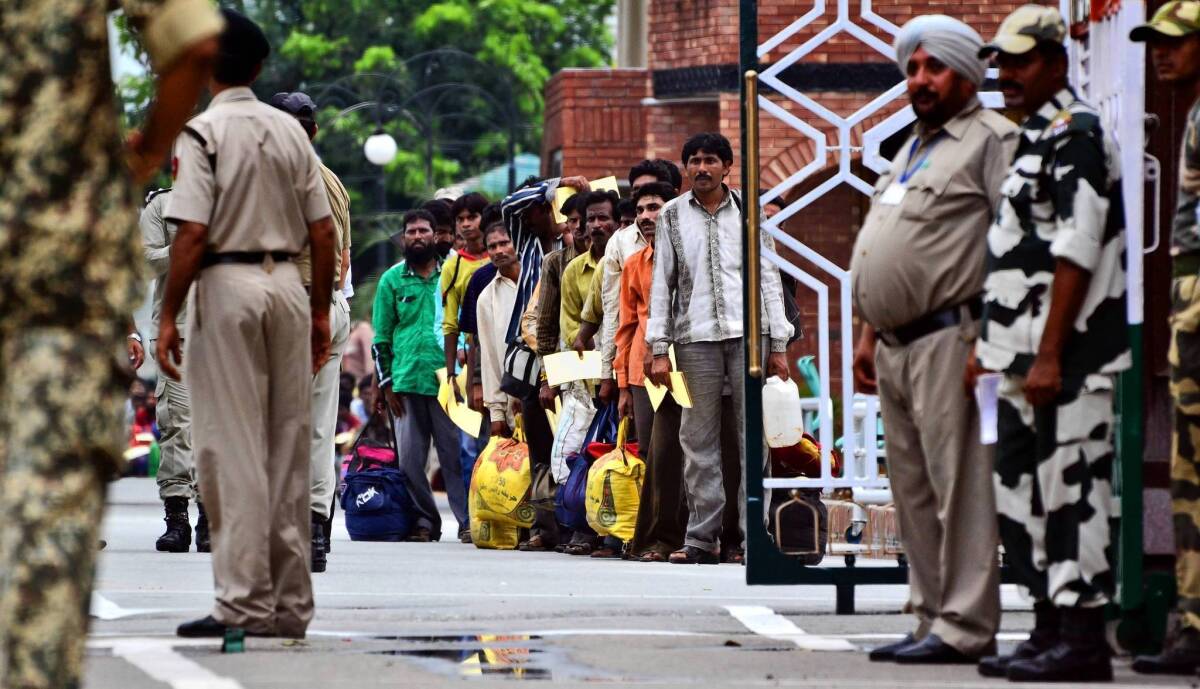Indian village buzzing over homecoming of fishermen freed by Pakistan

- Share via
NEW DELHI — Residents of Vanakbara, a fishing village in the western Indian district of Diu near Pakistan, were busy Saturday preparing garlands, laying out their best clothes and checking train schedules after dozens of their relatives crossed the border into India after months in a Pakistani prison.
The 61 detainees from this area were among 338 Indian fishermen let out of a Karachi prison and returned to India during the day, a goodwill gesture by Islamabad after weeks of deadly clashes along the de facto border in disputed Kashmir. Villagers said they expected their relatives to reach home within a day or two.
“The entire village is chirpy and can’t talk about anything but their return,” said Shankar Bhagwan Bhariya, 44, an office worker in Vanakbara, waiting for three relatives jailed for nearly a year. “We’re having a huge celebration in the village. Nearly everyone will go to the railway station to meet them.”
Indian and Pakistani fishermen are frequently caught in each other’s territorial waters and jailed, but this is the largest release since 417 were freed in 2003, said Veljibhai Masani, an executive member of the Federation of Indian Fisheries Industry trade group.
Pakistani Prime Minister Nawaz Sharif has expressed hope that recent violence — which has seen five Indian soldiers, three Pakistani soldiers and two Pakistani civilians killed — won’t undermine efforts to improve relations between the two nations.
Pakistani officials said the release was a peace offering aimed at easing distrust and improving ties.
“There is a need to build mutual confidence and, for that, the process of dialogue which has been stopped by India must resume,” said Aizaz Ahmad Chaudhry, a Foreign Ministry spokesman. “We do hope that India would also release Pakistanis languishing in Indian jails, especially those who have completed their term.”
Indian Prime Minister Manmohan Singh has called on Pakistan to control militants accused of initiating attacks in Indian-held territory if it really hopes to improve ties. With a general election scheduled early next year, his government is also under pressure from political opponents who have accused it of being soft on Pakistan.
The Indian government says about 100 Indian fishermen remain in Pakistani prisons, and Pakistan says 171 of its fishermen are held in India. The Indian Foreign Ministry said there were no immediate plans to release the Pakistanis.
Fishermen on both sides are often victims of politics and creaky justice.
“The maximum punishment in these cases is six months,” said Jatin Desai, a Mumbai-based activist with the Pakistan-India People’s Forum for Peace and Democracy, campaigning for the fishermen’s release. “But the courts in South Asia are very slow, so in reality it can be two or three years.”
Bhariya, the Vanakbara office worker, said his family learned that his two nephews and a brother-in-law had been taken a year ago after hearing from recently returned fishermen who had seen them in Pakistani jails. Family members then submitted proof of the relatives’ citizenship to Indian authorities and waited.
“These things happen, we wait for fate to take its course,” he said. “There is never any guarantee when the missing person will come back.”
Many vessels are simple and lack GPS navigation equipment, so it’s easy to drift into the other nation’s waters, locals say, whether propelled by the wind or tides or while following a promising school of fish.
Family members said the detained fishermen write every few months, mentioning the poor jail conditions, their homesickness and their desire to be released. Those who have returned say their food each day was just four chapatis — a flat bread — and that the lived with 200 other prisoners in a giant cell with only two toilets.
“They describe the jail as hell,” Bhariya said. “They come back fragile and weak, shrunken in size. We have to take them to the hospital.”
Having the main breadwinner imprisoned for an extended period places great hardship on families, residents said, forcing wives to pick up odd jobs as maids and house cleaners. Many families pull their children out of school, unable to afford the fees.
Families of the fishermen said their relatives pay dearly for a small mistake, including many whose boats have been seized.
“Pakistan knows these men are only simple fishermen, not terrorists,” Bhariya said. “They only know how to catch and cook. Ultimately, Pakistan was under pressure to release the innocent.”
Tanvi Sharma in The Times’ New Delhi bureau and special correspondent Nasir Khan in Islamabad contributed to this report.
More to Read
Sign up for Essential California
The most important California stories and recommendations in your inbox every morning.
You may occasionally receive promotional content from the Los Angeles Times.










